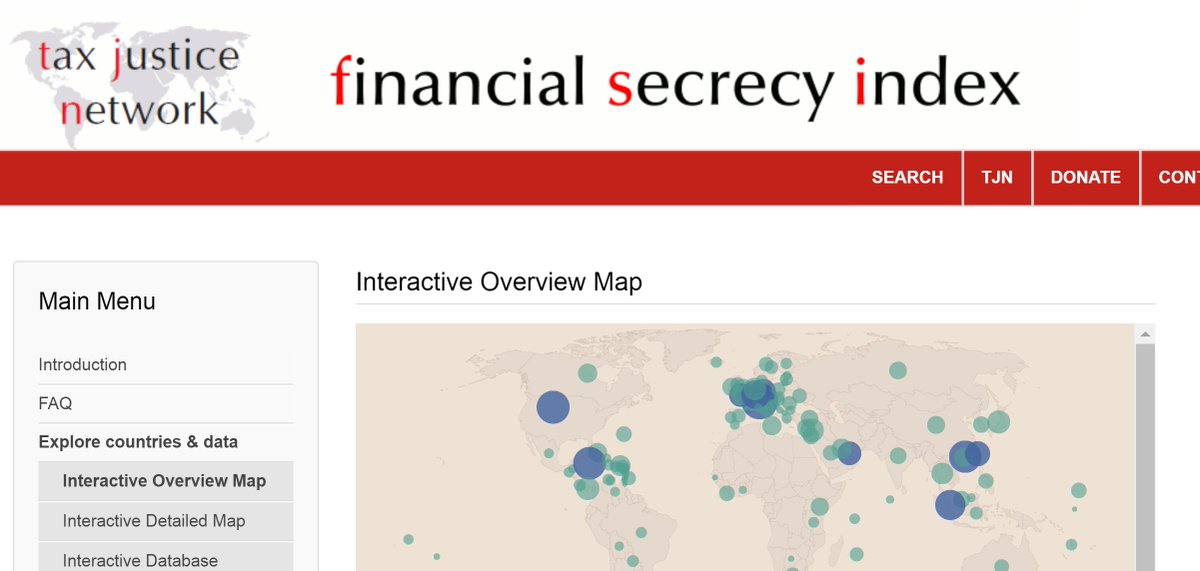“Journalism is printing what someone else does not want printed: everything else is public relations.”
Longish thread on the shutting down of journalism (and whistleblowing) that makes people uncomfortable…
1/
Longish thread on the shutting down of journalism (and whistleblowing) that makes people uncomfortable…
1/
When @TaxJusticeNet was getting started in the early 2000s, @jechristensen56 and others were opening up a whole new area
2/
2/
In many countries, there had been little or no public scrutiny of #taxjustice issues like the widespread abuse of ‘tax havens’ by elites, or the systemic nature of tax avoidance by major companies and their enablers like the big four accounting firms
3/
3/
They may be common in the news today, but it took TJN until 2007 to get the first major frontpage story on multinationals’ tax avoidance
/4
/4

Meanwhile, in financial secrecy jurisdictions like Jersey, those brave enough to be associated with tax justice ideas were routinely harassed and ostracised
/5
/5
Often, we’ve found that the smaller is the jurisdiction – from Singapore to the Isle of Man, or Luxembourg to Mauritius – the greater the pressure to keep quiet. (See also: Malta...)
6/
6/
The rise of social media since then has not created the phenomenon of harassing those whose questions, or reporting makes people uncomfortable. It just gives it a different shape and visibility
7/
7/
The attacks on and attempts to dehumanise journalist #DaphneCaruanaGalizia before her murder, and similar treatment for other ‘enemies’ of Malta’s ruling Labour party, are shocking but not new
8/
8/
As @The_Shift_News show in their series of investigations, this dehumanisation of journalists echoes down from genocides past
theshiftnews.com/2018/08/19/dis…
9/
theshiftnews.com/2018/08/19/dis…
9/
In the US, of course, President Trump’s open attacks on the media - as UN experts have argued - “undermine confidence in reporting and raise doubts about verifiable facts” and may “increase the risk of journalists being targeted with violence.”
theguardian.com/us-news/2018/a…
10/
theguardian.com/us-news/2018/a…
10/
The overarching threat is to the prospects for fair political representation. But nested within it are specific threats to individuals whose reporting makes the powerful uncomfortable.
11/
11/
For an insight into the personal impact of those threats, and to get angry, listen to @sarahkendzior and @AndreaChalupa discuss their experiences of the 2016 US election campaign on Gaslit Nation patreon.com/gaslit
12/
12/
Or read the extraordinary stream of abuse directed towards @AngelaHaggerty - by fans of a football club. (The offence? Editing a book about how the club went bust)
13/
https://twitter.com/AngelaHaggerty/status/1034516627956682753
13/
Important to see the journalists’ union standing up there nuj.org.uk/news/nuj-conde…
14/
14/
As well as the human impact, the abuse of journalists also changes the context. Whether that’s autocrats around the world using Trump’s ‘fake news’ agenda to justify their own, explicit media oppression…
15/
15/
…or broader toleration of legal action against the media – from e.g. Luxembourg’s disgraceful treatment of the #LuxLeaks whistleblowers…
taxjustice.net/2018/05/15/lux…
16/
taxjustice.net/2018/05/15/lux…
16/
…to the ludicrous situation in which @englishpen, the campaign for writers’ freedom, laments the murder of #DaphneCaruanaGalizia but retains a trustee whose law firm had sought, in the words of her family, to “cripple” her financially theguardian.com/world/2018/jul…
17/
17/
To return to Orwell: the journalism that really matters, is the journalism that makes people *in power* uncomfortable. And people in power have the greatest means to fight back. Through the law; through politics; through social media; through violence.
18/
18/
[If you’re not making people uncomfortable, you’re doing it wrong.]
19/
19/
If nobody is making people in power uncomfortable, they are free of accountability and have effective impunity. And if nobody is investigating the controlling minds behind the murder of #JanKuciak or #DaphneCaruanaGalizia, then they do too.
20/
20/
As societies, we rely on people who make others uncomfortable for the protection of our democratic processes.
(And indeed our football: taxjustice.net/topics/theoffs… …)
21/
(And indeed our football: taxjustice.net/topics/theoffs… …)
21/
The question is how we can ensure that we protect the people who make those in power necessarily uncomfortable
22/
22/
And how do we resist the politics that undermines journalists and whistleblowers, erodes their protection, leads to media concentration and lack of diversity, and makes impunity more likely and accountability but a pipe dream?
23/
23/
Transparency is not a full answer, but it can go a long way: changing the context in which decisions are made. Measures like an international standard to end anonymous company ownership won’t end corruption, but it will shift a lot of decisions.
24/
24/
Measures to bolster the legal protection for a free media, and to ensure effective investigation of crimes against journalists, won’t end attacks, but will shift some decisions
25/
25/
Positive engagement, in politics and including on social media, can do the same. If you can support those facing abuse, please do. If you can safely call out the abuse, please do.
26/
26/
Ultimately, we're all free-riding on the willingness of journalists and others to take risks on our behalf. To make those in power uncomfortable, for us.
We all stand to benefit, in terms of the quality of institutions and democracy we enjoy. So we should do what we can.
27/
We all stand to benefit, in terms of the quality of institutions and democracy we enjoy. So we should do what we can.
27/
As discussed above...
"Robert Chain called the Globe’s newsroom and claimed he would shoot staff members in the head, per FBI... later specified that he was retaliating against the newspaper’s criticism of Trump’s attacks on the news media."
theguardian.com/media/2018/aug…
"Robert Chain called the Globe’s newsroom and claimed he would shoot staff members in the head, per FBI... later specified that he was retaliating against the newspaper’s criticism of Trump’s attacks on the news media."
theguardian.com/media/2018/aug…
• • •
Missing some Tweet in this thread? You can try to
force a refresh





